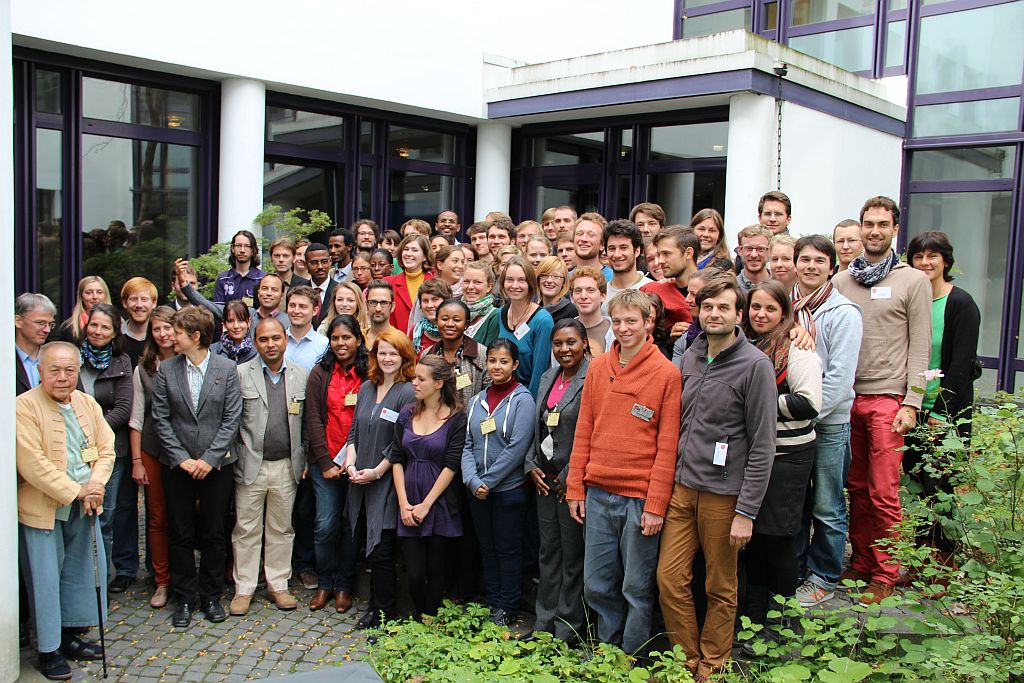VIEIRA, Miguel Said. “Intellectual Commons, Commodification and Open Business Models“. RLC Fall Academy on the Economies of the Commons. Bonn: 2012. Disponível em: <http://ssrn.com/abstract=2620430>.
Em inglês. Comunicação (resumo de minha pesquisa de doutorado) apresentada na Fall Academy 2012 do Right Livelihood College, que teve o tema “Economies of the Commons”. O arquivo contém os slides de uma apresentação resumindo minha pesquisa de doutorado; clique aqui para formato ODF.
O Right Livelihood College (RLC) é um braço da Right Livelihood Award Foundation, conhecida como um “Prêmio Nobel alternativo”. A Fall Academy, por sua vez, é uma oficina organizada pelo RLC com um grupo de doutorandos selecionados; além de apresentarem e debaterem suas pesquisas, os participantes interagem com laureados do Right Livelihood Award. (Entre os premiados até hoje estão grandes figuras como Pat Mooney, Mordechai Vanunu, o MST, Vandana Shiva, Chico Whitaker, Percy & Louise Schmeiser, Rachel & Uri Avnery, Daniel Ellsberg e Edward Snowden.)
Na edição de 2012, éramos 11 pesquisador es da África, Ásia e América Latina (além dos estudantes da Universidade Alanus, que co-organizou o evento), e os laureados participantes foram Sulak Sivaraksa (Tailândia) and Helena Norberg-Hodge (Austrália). Foi interessante ver como, mesmo entre pesquisadores de países pobres como os nossos, o tema de bens comuns é tratado de forma bastante variada: das abordagens mais engajadas e críticas (enfocando resistência popular e questões de gênero, por exemplo), às que defendiam a mercantilização dos recursos compartilhados (por meio dos chamados serviços ambientais).
es da África, Ásia e América Latina (além dos estudantes da Universidade Alanus, que co-organizou o evento), e os laureados participantes foram Sulak Sivaraksa (Tailândia) and Helena Norberg-Hodge (Austrália). Foi interessante ver como, mesmo entre pesquisadores de países pobres como os nossos, o tema de bens comuns é tratado de forma bastante variada: das abordagens mais engajadas e críticas (enfocando resistência popular e questões de gênero, por exemplo), às que defendiam a mercantilização dos recursos compartilhados (por meio dos chamados serviços ambientais).
Segue o resumo submetido na seleção para o evento, e que também sintetiza a apresentação que fiz lá.
Ph.D. research abstract
This research project analyses the possible relations between intellectual commons and commodification, attempting to determine if they are incompatible and whether commodification can arise in or from within a commons. Also, on a more practical level, it assesses how emerging business models affect that possibility.
It explores Elinor Ostrom’s institutionalist approach to commons theory, evaluating its merits (for instance, the empirical refutation of Hardin’s “tragedy of the commons”), as well as limitations (reliance on methodological individualism and absence of more systemic considerations) that can lead to blind spots. This approach is confronted with others, such as those found in works by Hardt & Negri and Peter Linebaugh; while not as systematic and easy to operationalize as Ostrom’s approach, they appear to address some of its limitations. The challenges in the application of these theories to intellectual goods are considered: the research proposes a dialectical reading of the economic concept of rivalry (as opposed to an essentialist reading, frequent in “techno-utopian” approaches), suggesting that intellectual goods always depend to some extent on material goods, and vice-versa.
The concept of commodification is borrowed from Polanyi and Marx: a commodity is something produced mostly in order to satisfy a market system (and therefore, a profit imperative); this is contrasted with production in a commons, geared to satisfying a community’s needs. The 20th century saw a sharp rise in the commodification of intellectual goods (aided by the worldwide stiffening of intellectual property laws); but the same technologies that made it so profitable to reproduce and disseminate such commodities also made it easier to share them in commons. The research argues that this curtails direct commodification; but that in some of the new, “open” business models that help sustain these commons (such as those based in advertising), commodification can mutate and reappear in unexpected forms.
Deixe um comentário